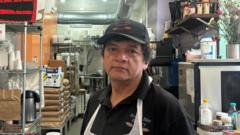Ethiopia is celebrating the start of its new year - 2018. The country has its own unique calendar, meaning it is seven years behind the Western calendar.
These yellow 'adey ababa' blooms are associated with the celebration. They grow wild around the capital, Addis Ababa, at this time of year. Small bunches have been selling for around 50 Ethiopian birr ($0.35; £0.25).
The seven-year gap comes down to the fact that the birth year of Jesus Christ is calculated differently in Ethiopia. When the Catholic Church amended its calculation in 500 AD, the Ethiopian Orthodox Church did not.
But the celebrations - known as Enkutatash - are not tied to the church, and for everyone in the country, it is a time to celebrate. Vendors in Addis Ababa come in from the countryside to sell adey ababa and freshly cut grass, both of which are used during traditional coffee ceremonies.
The birthplace of coffee is widely considered to have been in the highlands of Ethiopia. The grass and flowers are used as decoration for the ceremonies during which the beans are roasted over an open fire, ground, and brewed in a clay pot.
Shopping areas, including the market of Addisu Gebeya, were heaving in Addis Ababa on New Year's Eve, despite the rain - as people rushed to prepare for the celebrations. Chickens are preferred for those cooking up a New Year's feast on a budget, making a spicy stew called 'doro wat', served with injera, a traditional fermented pancake-like flatbread.
This year has brought a greater sense of unity and pride as the week began with the formal launch of the Grand Ethiopian Renaissance Dam, built on a tributary of the River Nile. Ethnic diversity and harmony are celebrated as people enjoy the goodwill of community. Live bands welcomed 2018 with music and sparklers, showcasing the vibrant essence of Ethiopian culture.
On New Year's Day morning, a traditional song known as 'Abebayehosh' is performed by young girls in neighborhoods throughout Addis Ababa to capture the spirit of this joyous occasion.



















